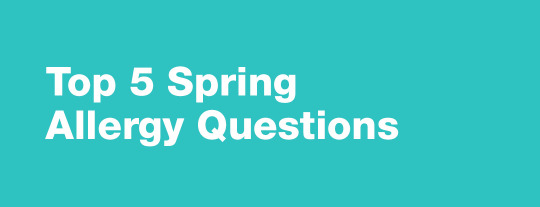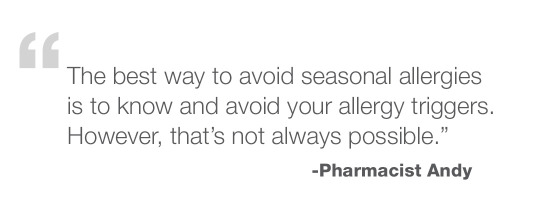
The good news: spring brings warmer weather! The bad news: it also brings more of the tree, weed and grass pollens that cause, or “trigger,” allergy symptoms for millions of people.
Seasonal allergies cause sneezing, wheezing, coughing, runny and stuffed noses, postnasal drip, watery eyes and itching of the nose and eyes. Symptoms can be mild or severe and can even lead to sinus or ear infections and worsening of asthma.
But there is more good news: seasonal allergies can be controlled.
1. Why do I get spring allergies?
If your allergy symptoms occur only certain times of the year, especially in the spring, summer and fall when high pollen counts are common, then you might have seasonal allergies. Each of these seasons has higher counts of certain of pollen in the air. Tree pollen counts are high in spring, grass pollen in summer and weed pollen in fall. Your health care provider or allergy specialist can diagnose seasonal allergies based on your history of symptoms, an exam and allergy skin tests.

2. How can I treat spring allergies?
Several over-the-counter and prescription medicines are available to prevent and treat symptoms of seasonal allergies:
- Antihistamines treat or prevent allergy symptoms by counteracting the effects of histamine, the naturally occurring chemical that causes allergy symptoms. Many antihistamines can be purchased without a prescription, including “non-sedating antihistamines,” such as loratadine and cetirizine, both available as generic drugs.
- Prescription nasal spray corticosteroids can reduce allergic inflammation but aren’t available over-the-counter.
- Cromolyn nose spray available over-the-counter, may be helpful for seasonal allergy symptoms.
- Decongestants such as pseudoephedrine can help to relieve a stuffy nose.
- Other helpful OTC products include lozenges to soothe a sore throat, saline nasal rinse and antihistamine eye drops.
- Allergy shots may be prescribed for patients with severe seasonal allergies who do not respond to the solutions indicated above.
3. Do allergy treatments have side effects?
Antihistamines can cause drowsiness especially in the older products, such as diphenhydramine and doxylamine. If you need to be alert (to drive a car or operate heavy machinery) a non-sedating antihistamine is the safer choice. Overuse of over-the-counter decongestant nasal spray can actually make your stuffy nose worse, so be sure to follow product directions and not use it beyond the maximum number of days.
4. What is an allergy ‘hot spot’?
Where you live makes a difference to your allergies. Find out the daily pollen counts and types of pollen currently found in your area. Last year, the 5 worst spring allergy cities (according to Weather.com) were:
- Louisville, KY
- Memphis, TN
- Baton Rouge, LA
- Oklahoma City, OK
- Jackson, MI

5. Can I prevent spring allergies?
Pay attention to what you did during the day when your symptoms appeared. If you were hiking, it’s probably pollen. If you were spring cleaning in the attic, it could be dust. If you were around a smoker, it could be the cigarette smoke. The best way to avoid seasonal allergies is to know and avoid your allergy triggers. However, that’s not always possible. When you can, stay indoors on dry windy days, especially mornings, when pollen counts are high. If over-the-counter allergy medications don’t work; if your symptoms are severe; or if you’re prone to secondary infections or worsening of asthma or other respiratory conditions, see your doctor.
Be well, stay well ~
Pharmacist Andy
Andy Stergachis, Ph.D., R.Ph. is the Director of the Global Medicines Program at the University of Washington in Seattle and a subject expert on public health and pharmacy-related topics.

